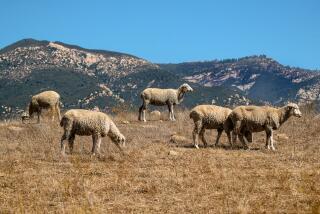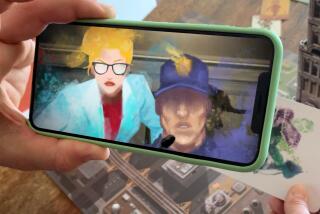Empire Interactive Hopes Players Will Flock to ‘Sheep’
- Share via
Modern sheep usually come in two varieties: edible and inflatable. But thanks to Empire Interactive’s new puzzling adventure game, “Sheep,” they’re now living large digitally as well. “Sheep” is a family-oriented game in which players must herd sheep around a variety of obstacles while solving brain-teasing puzzles. Chris Kiveal, project director for developer Mind’s Eye, reveals his fetish for the flock.
Question: What do fans demand of their puzzle games?
Answer: Challenge, fun, frustration and addictiveness. The whole concept of “Sheep” is very original and unique, so it’s challenging in that respect. Plus the levels also get more and more difficult as you work through the worlds. The game play is fun, and we have injected as much humor as possible to make the product quirky. And finally, addictiveness: We spent a great deal of time and effort making the levels different from each other, and also connecting them together to give the experience a mission-driven feel.
Q: Should puzzlers be more reflex or gray matter intensive?
A: A little bit of both. In “Sheep” for instance, we have puzzles that take quite a bit of thinking about, and puzzles that require quick reflexes to herd sheep on to the right spot at the right time.
Q: Where did the idea for “Sheep” come from?
A: Ben Everett had been developing characters based around sheep ever since he attended university. Originally, these ideas had been for an animation series. In the meantime, Martin Batten had been playing with the idea of a herding game, and so when the two put their ideas together, they conceived “Sheep” the game. I’m not too sure who was father and who was mother, though.
Q: How did you accurately model sheep behavior?
A: Trial and error. We didn’t really study sheep too much--not for work purposes anyway. We just thought about what sheep do, how they behave, and created and tweaked code until we were all happy with it. The good thing is, however, that the game has been played by people who have worked on farms, and they tell us our flocking is perfect.
Q: What sort of humor were you going for?
A: Situation comedy.
Q: Why not pigs, cows, ducks or chickens?
A: Who would write a game about chickens?
Q: Is it really kosher to waste helpless critters in a family-oriented title?
A: We kept the gore factor very low--much to the irritation of artists and programmers--and all mishaps are in the “Tom and Jerry” mold, rather than “Itchy and Scratchy.”
Q: Any specific cartoons inspire the in-game antics?
A: Believe it or not, manga [a Japanese comic style] was the main influence.
Q: Is the average day at work wild and woolly?
A: It all starts at 9 sharp. We exchange pleasantries, then drink tea, although some of the more “out there” artists and programmers drink coffee. During the afternoon, somebody usually initiates a conversation, maybe about cars or office furniture; although sometimes it gets a bit racy and we talk about girls and what it must be like to lose your virginity. In the evening, we all race Formula One cars and powerboats. Then later in the evening, we model for fashion magazines.
Q: How much and what sort of play testing goes into balancing the game?
A: The initial play testing is done by the programmers, artists and producers. It then goes to Empire, whose QA [quality assurance] department puts it through its paces, testing every intricate part of game play. Empire QA then contacts Mind’s Eye and moans and moans and moans.
Q: What was the strangest thing that happened during development?
A: This actually happened only a couple of weeks ago. Chris Kiveal, the producer of “Sheep,” was standing outside the building waiting for a delivery, when all of a sudden, a small flock of sheep ran from an entrance from the road, into the car park at Mind’s Eye and proceeded to run riot around the cars. The hapless flock eventually ran into the lake and swam to a small island in the middle. Sheep can swim, a fact that we got wrong in the game.
Q: What qualifies a designer for this kind of oddball job?
A: Insanity, no social life, no girlfriend, a liking for fast food, imagination, art skills, [being] able to understand the impact of designs on game play, bad temper.
Q: To what lengths did you go to research these animals?
A: Censored.
*
Scott Steinberg is a freelance writer specializing in video games.
More to Read
The biggest entertainment stories
Get our big stories about Hollywood, film, television, music, arts, culture and more right in your inbox as soon as they publish.
You may occasionally receive promotional content from the Los Angeles Times.










